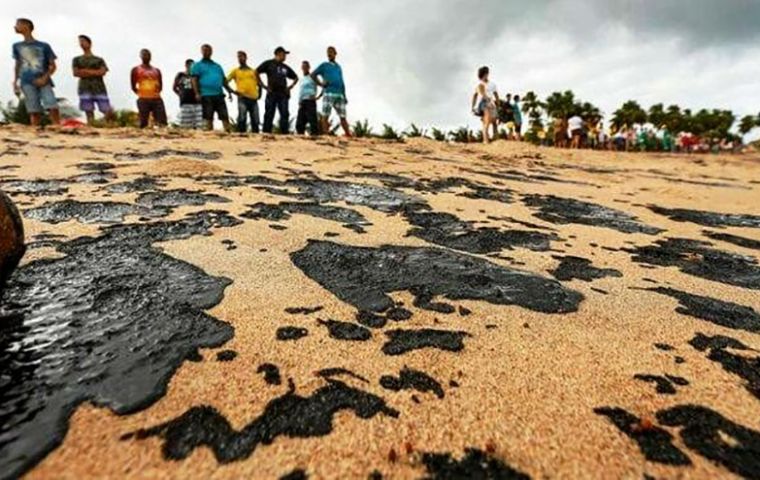MercoPress. South Atlantic News Agency
Brazilians desperately cleaning the oil spill ahead of the peak tourism season
 As ocean currents brought large globs of crude to shore near Recife, locals rushed to the normally picturesque beaches and used their bare hands to remove the oil
As ocean currents brought large globs of crude to shore near Recife, locals rushed to the normally picturesque beaches and used their bare hands to remove the oil Months after thick oil began turning idyllic beaches in Brazil into “black carpets,” workers and volunteers wearing rubber gloves race against time to scrape off the remaining fragments ahead of the country's peak tourism season.
Paiva, Itapuama and Enseada dos Corais in the northeastern state of Pernambuco are among hundreds of beaches fouled by an oil spill that began to appear in early September and has affected more than 2,000 kilometers of Atlantic coastline.
As ocean currents brought large globs of crude to shore near the capital Recife in recent weeks, locals rushed to the normally picturesque beaches and used their bare hands to remove the toxic material coating sand, rocks and wildlife.
Thousands of military personnel have been dispatched to help clean up the oil that has killed dozens of animals, including turtles, and reached a humpback whale sanctuary off Bahia state that has some of the country's richest biodiversity.
It is the third major environmental disaster to strike Brazil this year. In recent months fires ravaged the Amazon rainforest and in January a mine dam collapsed in the southeast, spewing millions of tons of toxic waste across the countryside.
Wildfires are still raging across the Pantanal tropical wetlands.
While thousands of tons of crude waste have been recovered so far, the space agency INPE said on Friday there might still be oil at sea being pushed by currents. It could reach as far south as Rio de Janeiro state, the agency said.
President Jair Bolsonaro warned on Sunday that “the worst is yet to come,” saying only a fraction of the spilled crude had been collected so far.
The government on Friday named a Greek-flagged tanker as the prime suspect for being the source of the oil slicks. The ship Bouboulina took on oil in Venezuela and was headed for
Singapore, it said. The tanker's operators have denied the vessel was to blame.




Top Comments
Disclaimer & comment rulesCommenting for this story is now closed.
If you have a Facebook account, become a fan and comment on our Facebook Page!